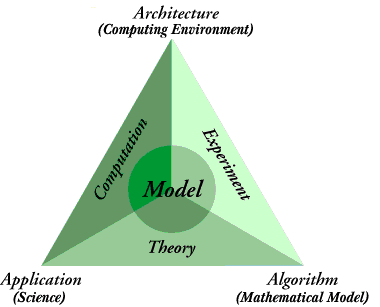What is Computational Science?
|
The first question usually asked by people who first hear of computational science is, "What is it?". Put simply, it is using computers to do science. Computational science involves the appropriate use of a computational architecture (possibly a computer, calculator, abacus, dice, poker chips, etc.) to apply some algorithm, or method, to solve some scientific application, or problem. This combination of Application, Algorithm, and Architecture results in a model, which can be used as a scientific tool.  The second question usually asked about computational science is "How does it fit in with traditional descriptions of science?" Often the mathematical sciences are described in terms of experimental science, theoretical science, and observational science. Experimental science is what is generally described by many high school textbooks "scientific method", where a hypothesis is tested by the use of a controlled study. For instance, a medical researcher might take different groups of three pack a day smokers who wish to quit, and apply different "treatments" to each group, and record the success rate for each group. Theoretical science is the application of mathematical logic to attempt to either predict new scientific laws from known laws, or to deduce simple laws which describe known phenomena. Some Social scientists refer to this type of research as Philosophical science. An example of theoretical science is Albert Einstein's theory of relativity, which resulted from his applying the known behavior of electromagnetic fields to gravitation, and predicting the results which would occur. A third branch of science, which is often lumped in with experimental science, is observational science (sometimes called descriptive science). Often, it is either not feasible, or immoral, to perform a controlled study of scientific phenomena. An astronomer simply cannot travel to the distant stars, but must rely on collecting and interpreting the light from the cosmos. Our medical researcher studying the effects of treatments to help people stop smoking would be thrown in jail for performing an experiment in which he/she required subjects to smoke three packs a day in order to study the effects. Computational science has elements of theoretical science, in that it relies heavily on mathematical logic. It has elements of experimental science, in that a model, once built, can be varied one parameter at a time to study individual effects. It has elements of observational science in that it's ultimate goal is a better description of the world around us. Computational science differs from theoretical science in that in order to apply theory, one often has to make broad assumptions. The widespread use of problems in which all objects are treated as spheres lead to the phrase "spherical cow model" to be applied to many theoretical solutions. While numerically cumbersome, computational science allows us to trade an exact solution to a very limited case for an approximated solution to a real world case. Computational science differs from experimental science and observational science in that it is a model of nature, not nature itself. However, if we know how nature behaves, we can use the computer to create models that can be used in place of experiments. The computational scientist can model the inside of the star (given some knowledge of how nuclear reactions occur). The computational scientist can study the effects on the population of widespread use of tobacco, without ever forcing a cigarette to a subject's lips. When used in its proper place, computational science can be an effective tool for allowing us to better understand the world around us. |